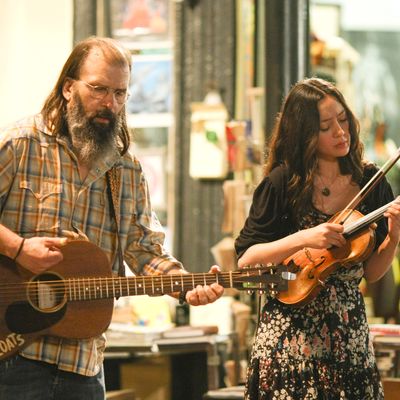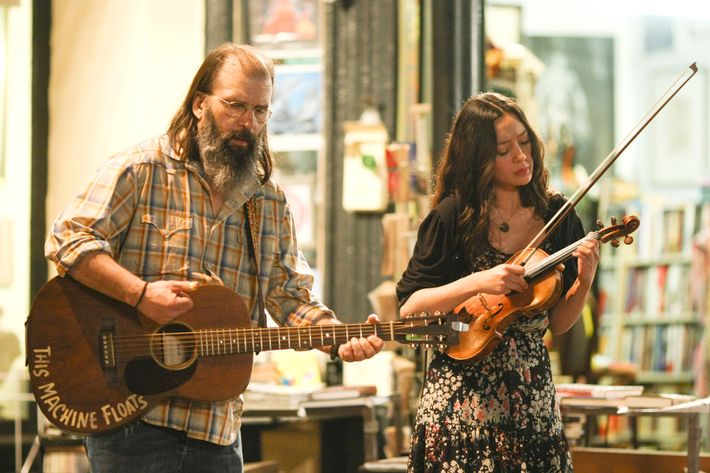

Two weeks ago, The Killing aired its first season finale. The Internet went blue with fury, a Vancouver hockey riot of TV fans, with many complaining, quite reasonably, that the show didnÔÇÖt answer its own adÔÇÖs murder-mystery question, ÔÇ£Who Killed Rosie Larsen?ÔÇØ (Which it did not, one outlying review to the contrary.) But unfortunately, even if one were willing to accept the finaleÔÇÖs ambiguity, it raised a more unnerving question, which is what The KillingÔÇÖs thirteen episodes added up to in retrospect: a mulch of rain, grief porn, red herrings, cell phones with no buzz setting, and terrible writing filmed with enough skill to deceive many viewers into believing they were watching quality television, not a stretched-out Law & Order: Better Cameras.
Showrunner Veena Sud participated in a few post-finale Q&As that inflamed even the most openhearted viewers. She explained that her series was an ÔÇ£anti-cop cop showÔÇØ not intended to ÔÇ£tie things up in a bow.ÔÇØ And she gave a prickly-haughty explanation that sounded as if she were channeling French feminist theorist Helene Cixous or possibly Julie Taymor: ÔÇ£Either itÔÇÖs a left brain journey where youÔÇÖre just connecting the dots of who the suspects are or itÔÇÖs more of a holistic journey where a young girl is murdered these are the potential suspects and this is why.ÔÇØ
The weirdest thing about all this nonsense was that there was a show out there that had been doing much of what Veena Sud was talking about, with little buzz. That show is HBOÔÇÖs Treme, created by David Simon, the showrunner who had created an actual anti-procedural procedural called The Wire. As everyone who griped about Treme during its occasionally satisfying but definitely overpreachy first season knows, Treme is no The Wire. ItÔÇÖs set in post-Katrina New Orleans. ItÔÇÖs about musicians (but not only musicians: ItÔÇÖs about cooks and New Orleans Indians and chatty D.J.ÔÇÖs). It is punctuated by loose sequences of musicians playing, jamming, killing time, joking around. And while The WireÔÇÖs central theme was corruption, Treme is a show about creativity ÔÇö a notoriously tough subject to dramatize.
As it happens, even as The Killing was getting all the press, Treme was having a quietly amazing second season, one that happened to feature a right-brain holistic journey and a refreshing unwillingness to tie things into bows. Because while Treme has plenty of lively stories in its mix, the most distinct thing about the show is its playful, circular, unpredictable, unresolved structure. Unlike almost every ambitious TV experiment, including great ones like The Sopranos and terrible ones like The Killing, Treme isnt an elevating riff on a sitcom, or a police procedural, or a soap opera. It isnt fueled by generic familiarity, even as something to reject. When I interviewed David Simon on the set of Treme, before his show began airing, he described Robert Altman as an inspiration and Altmanesque is how the show feels: intuitive, sly-humored, unexpectedly moving, subtle and full of visual surprise, adding up in bits and pieces, wild performances bracketing scraps of dialogue, quick cuts, an emphasis on facial expressions and a slow, flowing, satisfying overall feel of  well, funkiness. Or gumbo. Oh God, I shouldnt say gumbo, should I?
Last season, that slow and funky flow also meant that the show could be boring. But as another recent raging cultural debate made apparent, one manÔÇÖs ÔÇ£boringÔÇØ can be another womanÔÇÖs ÔÇ£totally worth it.ÔÇØ And for me, the second season of Treme is not only un-boring, itÔÇÖs thrilling ÔÇö the rare television show that rewards careful attention. In this way, the show actually is a bit like The Wire. And in these dicey days for TV ambition, Treme has become a rarity, a show that pays back our loyalty rather than leaves us feeling ripped off.
IÔÇÖm not requiring you to re-watch season one, if it wasnÔÇÖt your thing. I watched it all, but I was mainly onboard for Kim Dickens as an underdog chef and also [spoiler alert] for the unexpected punch-in-the-chest of Creighton BurnetteÔÇÖs suicide. But now IÔÇÖm interested in all the characters, even the chatty D.J., even the gloomy New Orleans Indian, hell, even the mediocre guitarist/junkie. Wendell Pierce is great, Khandi Alexander is great, Melissa Leo is great, her daughter is great, IÔÇÖm not quite as interested in the saintly violinist but she certainly has her moments, and the newest character ÔÇö a shark of a real-estate speculator played by hip-twitching Jon Seda ÔÇö adds a welcome note of aggression. Unlike the dour cartoons in The Killing, these people feel at once real and unfamiliar. The Killing got a ton of unearned praise for its portrayal of Rosie LarsenÔÇÖs bereaved family, but Treme has gone a mile deeper into grief, tracing CreightonÔÇÖs familyÔÇÖs shock and denial, but also giving other characters meaningful traumas that scar rather than resolve. ThereÔÇÖs plenty of joy on Treme. But when its characters hurt, itÔÇÖs more than one-note wailing.
I donÔÇÖt want to give away every plot turn, since youÔÇÖre about to download season two On Demand, but suffice it to say that people are suffering. Crime is back in New Orleans: One character was gang-raped, and in a truly devastating sequence that aired the same night as The Killing finale, another was murdered. And yet violence isnÔÇÖt the showÔÇÖs engine. The artistÔÇÖs life is. ThereÔÇÖs a meta-quality to many of the scenes of artists making art, since nearly all of them touch on debates about which types of creativity are authentic, political, pleasurable, meaningful, or lucrative, questions that clearly apply to the creation of the series itself. But rather argue like an op-ed, Treme feels like poetry, and even better, it has begun to incorporate critiques of its own New Orleans exceptionalism, playfully showing the ways these attitudes can sour into pedantry, as they do on occasion with that Indian Chief, who is currently in New York driving his jazz musician son crazy with his passive-aggressive provincialism.
Did I say poetry? I meant music. Often, Treme feels like weÔÇÖve been invited to a very cool party. Or a party full of parties: The party scenes on this series are spectacular. IÔÇÖm not into jazz ÔÇö at all ÔÇö and IÔÇÖm loving the music scenes. Look, people, what can I say, youÔÇÖll just have to trust me. The finale is this Sunday, but you know how to use that DVR.

